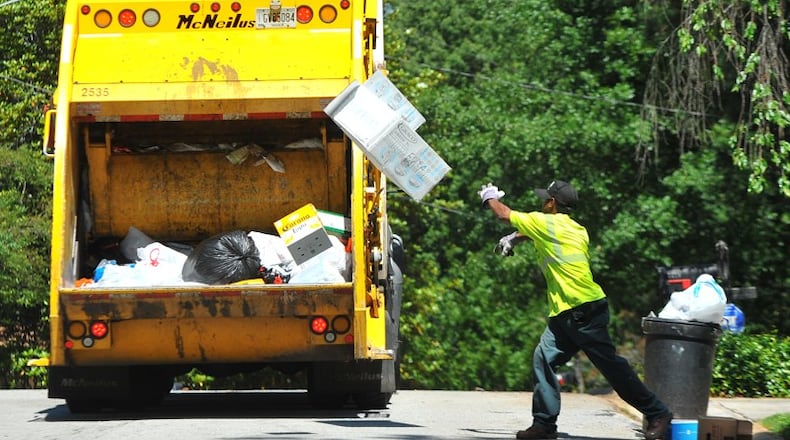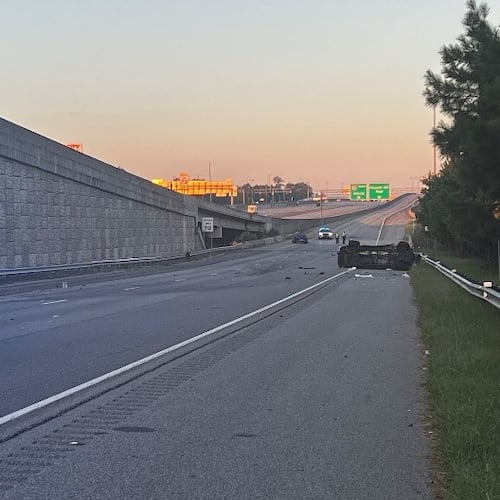An investigation by DeKalb County’s independent auditor found that sanitation workers and residents were mixing recycling and garbage together and concluded that 38% of recycling material the county collected from July through September was contaminated and unsuitable for recycling.
The audit stems from an investigation into why the county has been collecting less curbside recycling than it did in the past — an analysis that occurred after The Atlanta Journal-Constitution reported last year that sanitation crews were seen emptying curbside recycling bins into the same trucks as the trash.
The report assessed, among other things, what proportion of the recycling materials brought to the county’s contractor were actually recyclable and what proportion was “residual solid waste.”
Recyclable materials can become contaminated with food waste, chemicals, organic matter and yard waste. Among the factors that may have contributed to the contamination rate found in the audit are commingling of materials both by sanitation workers at curbside collection and by residents unaware of proper recycling guidelines, the audit found.
“While a ‘zero’ contamination rate is impractical, the benchmark percentage for contamination in single-stream residential recycling typically ranges from about 15% to 25%,” the audit says.
The contract between DeKalb and Pratt Industries, which sorts, cleans and processes recycling, allows the company to return the residual waste that is not recyclable to the county landfill for a fee. But the audit says DeKalb has not received any money from contaminated recycling because Pratt has not used the county’s landfill.
Chief Audit Executive Lavois Campbell, whose office conducted the audit, said he does not know where Pratt was taking that trash, and representatives of Pratt could not immediately be reached for comment on Friday.
Credit: SPECIAL PHOTO
Credit: SPECIAL PHOTO
DeKalb’s chief executive, Michael Thurmond, has admitted that senior county leadership had made the decision to mix recycling and garbage during the pandemic, describing it as a “battlefield decision.” Thurmond said sanitation crews, often sitting three across in a truck, were getting COVID or were exposed to it at a far greater rate than other employees.
This week, Commissioner Ted Terry said the auditor’s report gives further evidence of “what was at first denied for two years by the administration.”
He and then-Commissioner Lorraine Cochran-Johnson had asked for the audit. Cochran-Johnson will replace the term-limited Thurmond as the county’s CEO on Jan. 1.
Terry added Wednesday that he supports funding a program that would put a recycling bin in every DeKalb classroom and provide a module every teacher could use to teach kids how the county’s recycling program works and why recycling is good for the environment.
“That’s just on us to provide better education,” Terry said.
According to the report by Campbell’s office, sanitation crew members confirmed that collectors and drivers mixed recyclables with trash. Residents also reported witnessing commingling.
Among other things, the audit recommends installing additional cameras on recycling trucks to monitor sanitation crews and make sure they are properly sorting recyclables and trash at the curb. The investigation also found that the county missed out on opportunities to save money and incurred extra costs by failing to finalize the Pratt contract in a timely manner.
The report adds that 15% of DeKalb residents surveyed did not participate in recycling and suggests the county do more to educate residents and engage them in the program. Commingling contaminates recyclable waste streams, increases waste management costs and reduces the recycling program’s efficiency, the audit says.
“This hampers environmental sustainability efforts and undermines community initiatives aimed at reducing landfill waste and conserving resources,” the report says.
In a statement Wednesday, county officials said the sanitation division “welcomes independent performance evaluations” and will use the auditor’s report to “continue its ongoing efforts to enhance and strengthen service delivery to its customers.”
The audit focused on the period from Jan. 1, 2021, through July 31 of this year. The auditor’s office received 493 responses to its residential recycling survey from across the county, and said it’s 97% confident that the results from the sample accurately reflect the views of DeKalb’s roughly 763,000 residents.
In 2018, DeKalb delivered about 13,000 tons of recycling materials to Pratt, compared with 6,100 tons delivered in 2022 and 8,100 tons in 2023, the report said. From January 2023 through July of this year, the county delivered 18,930 tons of recyclable material for sorting and recycling at a cost of $981,642.
Credit: Sara Gregory
Credit: Sara Gregory
Residents and businesses can recycle materials like paper, cardboard, plastics and metal cans in roll carts. Glass is recycled separately and must be brought to designated drop-off locations.
The report found the county could have saved $394,738 from Jan. 1, 2022, through April 30, 2024, if it had delivered cardboard separately to Pratt Industries. The report found sanitation crews already collect and weigh cardboard separately at the county’s Central Transfer Station. But sanitation crews then mix the cardboard in with other recycling material before delivering it to Pratt.
“That’s key,” Commissioner Terry said of the finding, “because we’re all about trying to save money and be efficient. We just don’t want to leave money on the table.”
Sanitation management, however, said they don’t think storing and delivering cardboard separately to Pratt would save money “because of the potential costs of doing so,” the report said. But the division’s management said it will conduct an internal review to identify any cost benefit from hauling cardboard directly to Pratt, noting that this would include the cost of buying trucks and hiring drivers.
The county also paid at least an extra $168,761 because it didn’t negotiate a contract with Pratt in a timely manner and operated without one for three months in 2023, the report found.
Residents who wish to participate in the county’s recycling program can find out how to register on the county’s website or can call 404-294-2900 or visit the Sanitation Division at 3720 Leroy Scott Drive, Decatur.
About the Author
Keep Reading
The Latest
Featured






